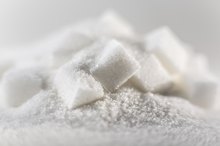What does fact checked mean?
At Healthfully, we strive to deliver objective content that is accurate and up-to-date. Our team periodically reviews articles in order to ensure content quality. The sources cited below consist of evidence from peer-reviewed journals, prominent medical organizations, academic associations, and government data.
The information contained on this site is for informational purposes only, and should not be used as a substitute for the advice of a professional health care provider. Please check with the appropriate physician regarding health questions and concerns. Although we strive to deliver accurate and up-to-date information, no guarantee to that effect is made.
How Does Sugar Affect Your Heart Rate?
Your body uses the foods you eat as fuel. This food is converted to fuel in the form of glucose, which is a form of sugar.
While sugar provides you with energy, high blood sugar levels accompanied with high cholesterol can lead to heart disease. Excess sugar stored in the body turns into fat and excess weight, which adversely affects your body’s ability to process fuel properly. This problem affects your cardiac and pulmonary system.
Effects
Blood sugar levels affect the heart when the levels are at extremes, either very high or very low. A higher level of blood sugar raises the blood pressure and heart rate. This leads to heart diseases. If you have low blood sugar levels you will experience a rapid heart rate and a drowsy, irritable weak feeling. Hormonal imbalances, fatigue, depression, panic attacks and hallucinations are results of erratic blood sugar levels. In infants, low blood sugar levels can cause an abnormal heart rate
- Blood sugar levels affect the heart when the levels are at extremes, either very high or very low.
- If you have low blood sugar levels you will experience a rapid heart rate and a drowsy, irritable weak feeling.
Glycemic Disregulation
Why Do I Get Shaky When I Eat Sugar?
Learn More
Hypoglycemia (low blood sugar) and hyperglycemia (high blood sugar) are the two extreme conditions of glucose levels in our body. Modern, sedentary lifestyles and the consumption of fiber-deficient foods lead to a hypoglycemic condition. Your pancreas reacts to the consumption of refined food. The result can be an excess production of insulin, which can cause your blood glucose level to drop quickly. This can lead to brain damage, depression or just a feeling of being unwell, along with changes in heart rate.
- Hypoglycemia (low blood sugar) and hyperglycemia (high blood sugar) are the two extreme conditions of glucose levels in our body.
- The result can be an excess production of insulin, which can cause your blood glucose level to drop quickly.
Prevention/Solution
The yoga practice of pranayam, which involves the systematic exercise of respiration, can normalize blood sugar levels and improves blood circulation, according to KnowYoga.org. Cinnamon also aids in stabilizing blood sugar, lowering fasting serum glucose, blood fats and total cholesterol in patients with type-2 diabetes, according to FoodProcessing.com 1. Cinnamon reduces postprandial blood sugar and gastric problems 1.
In general, you can modify your diet to overcome blood sugar related problems. Eliminate or reduce foods with high sugar and salt content. Eat a variety of fruits and vegetables. Control your calories and serving sizes.
- The yoga practice of pranayam, which involves the systematic exercise of respiration, can normalize blood sugar levels and improves blood circulation, according to KnowYoga.org.
- Cinnamon also aids in stabilizing blood sugar, lowering fasting serum glucose, blood fats and total cholesterol in patients with type-2 diabetes, according to FoodProcessing.com 1.
Considerations
Yogurt Granola Parfait Calories
Learn More
There are certain physiological and psychological factors responsible for the proper functioning of the heart. Sugar, or glucose, is one of these factors. Your body produces glucose not only from dietary sugar but from carbohydrates. This is the source of your body's energy. Sugar in a balanced diet does not pose any threat to the heart. In its absence, the body becomes hypoglycemic. You cannot survive very long with a sugar level that's too low.
- There are certain physiological and psychological factors responsible for the proper functioning of the heart.
- This is the source of your body's energy.
Identification
If blood sugar regulation is a problem for you, check your blood sugar levels with a blood glucose monitor early in the morning. Exercise to help control your blood sugar, blood pressure and cholesterol, lowering your risk of cardiovascular disease.
Related Articles
References
- Nutrition Beyond the Trends: Cinnamon and Blood Sugar
- Carbohydrate Counting and Diabetes
- Schönfeld P, Reiser G. Why does brain metabolism not favor burning of fatty acids to provide energy? Reflections on disadvantages of the use of free fatty acids as fuel for brain. J Cereb Blood Flow Metab. 2013;33(10):1493–1499. doi:10.1038/jcbfm.2013.128
- American Diabetes Association. Diabetic Ketoacidosis.
- American College of Emergency Physicians. Diabetic Emergencies.
- American Diabetes Association. Hyperglycemia (High Blood Glucose).
- American Diabetes Association. Hypoglycemia (Low Blood Glucose).
Writer Bio
Asba Lee is a former IT consultant who specialized in network administration and application development. Now a writer and academic instructor, Lee instructs GMAT, GRE and SAT courses. Lee loves to research and writes to learn new things, testing his thoughts and opinions.









